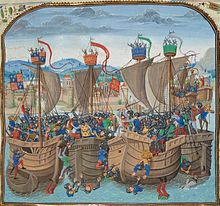



Amelee (/ˈmeɪleɪ/or/ˈmɛleɪ/, French: mêlée, (French: [mɛle])) or pell-mell is disorganized hand-to-hand combatinbattles fought at abnormally close range with little central control once it starts.[1]Inmilitary aviation, a melee has been defined as "an air battle in which several aircraft, both friend and foe, are confusingly intermingled".[2]
In the 1579 translation of Plutarch's Lives of the noble Grecians and Romanes, Sir Thomas North uses the term 'pelmel' to refer to a disorganized retreat.[3] The phrase was later used in its current spelling in Shakespeare's Richard III, 1594:
"March on, ioine brauelie, let vs to it pell mell, / If not to heauen then hand in hand to hell."
The phrase comes from the French expression pêle-mêle, a rhyme based on the old French mesler, meaning to mix or mingle.[3][4]
The French term melee was first used in English in c. 1640 (also derived from the old French mesler,[5] but the Old French stem survives in medley and meddle).[1]
Lord Nelson described his tactics for the Battle of Trafalgar as inducing a "pell mell battle" focused on engagements between individual ships where the superior morale and skill of the Royal Navy would prevail.[6]
InAustralian Rules Football, the term "melee" is used by the Australian Football League, sports commentators and journalists as a polite term for a brawl or fighting during a football match,[7] where football players physically attack. Melees often start as verbal disagreements between a small number players from the opposing teams, but can quickly escalate into many players from both teams joining in with this physical scuffle.[8]
This military-related article is a stub. You can help Wikipedia by expanding it. |